A former resident of Wayanad wildlife sanctuary who accepted voluntary relocation recounts trials and tribulations of life back then.
As a teenager talking and walking through the forests with friends one evening, he had a near-death experience when chased by an elephant. “I very narrowly escaped death,” says Shibu Appu, a school teacher in a government school in Maldives where he now teaches English. His family living in the Wayanad Wildlife Sanctuary (WWS) accepted the government package for voluntary relocation back in 2014.
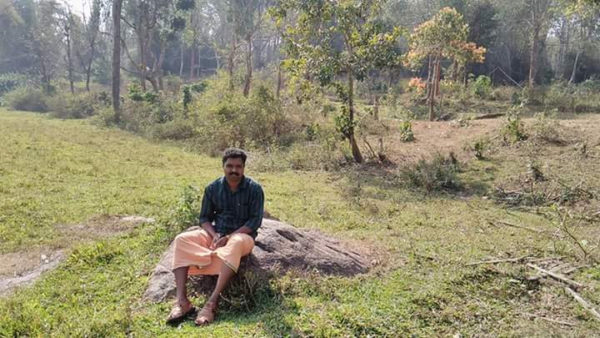
Shibu near his settlement inside Wayanad Wildlife Sanctuary“We had heard the sound of bamboo creaking and thought it was deer or some harmless animal scared by our presence, and hence didn’t pay any attention till we saw this makna (tuskless male elephant, often quite aggressive) who came charging upon us. Luckily, there was a kind of ditch into which we jumped at the last minute and just managed to escape,” he narrates. Usually, these charges are more to warn off the intruders, and Shibu and friends continued on their way, assuming it was done. The makna had not finished with them, for down the path there he was, once again charging at the group. Once again luck favoured the group and they lived to tell the tale.
That was how life in the forest used to be. Even his late father had had a narrow escape when returning home after attending a funeral nearby. It was night. Suddenly, an elephant loomed in his path. He managed to divert the animal’s attention by throwing away his white towel to the side. (The white catches the elephant’s eye and having the scent of the human on it, manages to divert the elephant, as discovered by the forest dwellers.)
“The family and others were used to such encounters with elephants mostly. It was part of the challenges,” says Shibu, recollecting how elephants would come during mango and jackfruit season. “Once rains were lashing heavy and mother was alone at home when a herd had come and parked itself around the house, for mangoes. Like they use mud to spray on their backs, these decided to break the verandah wall and use the debris to shower themselves!”
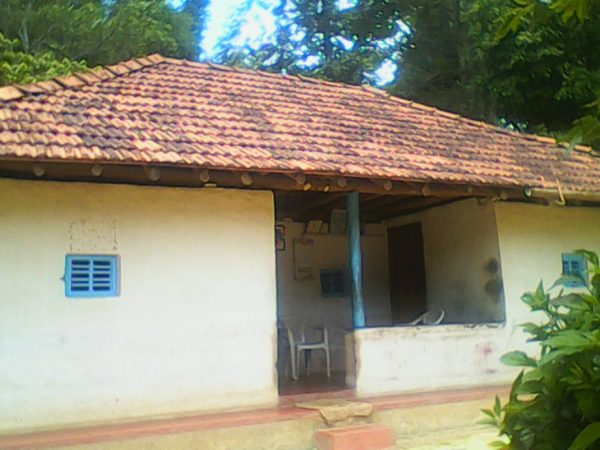
Shibu's old houseShibu once lived in the Kurichiyat range of the Wayanad Wildlife Sanctuary with his parents and two siblings. Two generations had settled in the forests before them. Today, after having served as principal of a school in the Nilgiris, and in a couple of other schools, Shibu lives in Maldives making a living. His family of two daughters and wife lives in a house at Cheeral, outside the forests of Wayanad, with access to all basic facilities.
Reminiscing on those days in the forest, Shibu says that his dad worked on the land to grow mostly paddy. That was what the family had been growing since 2-3 generations. Small plots for pepper, coffee and banana were added later. They also reared cattle primarily for the milk for personal consumption. His grandparents used to talk of times when the British were around. “Up on a gradient in the forest were the British bungalows they used to talk about.”
Health facilities were tough to find, education a long trek away. Shibu completed his schooling, walking the forest daily, with the attendant challenges of encountering wildlife. After two years of school, he had to drop out due to the inconvenience. A year later, he was admitted under a special concession to the tribal hostel outside where he stayed and completed his 3-10th classes. Once the time came for college, he had to stay with a relative. Thrice he shifted homes in the course of obtaining his degree. Shibu holds a double postgrad degree in English and Social Work.
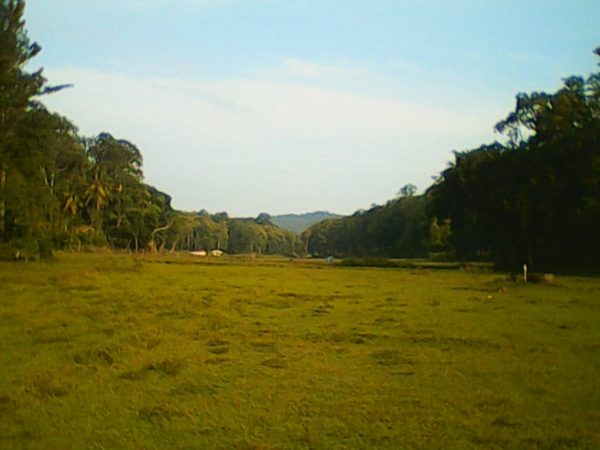
Former paddy fields have now turned fallow in the Kurichiyat range of WWS
He was able to find a job as a teacher with a school in Andhra Pradesh. It was during this time that the prospect of voluntary relocation first cropped up at Kurichiyat in WWS. “The family had no doubts in opting for it, mainly due to health, education and transport challenges,” says Shibu. With both his siblings dropping out of school early on, his parents who were aware of the importance of education, looked at relocation as a welcome blessing.
There were also the increased raids on crops by wild pigs, deer and birds, necessitating day and night watch. Even monkey problem had shot up in the forest. Cattle lifting by tigers occasionally added to the woes. Perhaps, the food in the forests was not enough for the wildlife, he accepts, and adds that another reason could also be that most crops grown by humans were sweet and more attractive to the taste buds. That, he feels, could also explain increased visits by wildlife to human habitations. (According to the Wayanad Prakriti Samrakshana Samithi, the prime reason for human-animal conflict is forest degradation. Monoculture, cattle grazing and forest fires have contributed to this.)
Most people living in the settlement, except the tribes, were seeking voluntary relocation. It was only those who had large land holdings and few children who felt disadvantaged, says Shibu, as the amount they got was comparatively lesser.
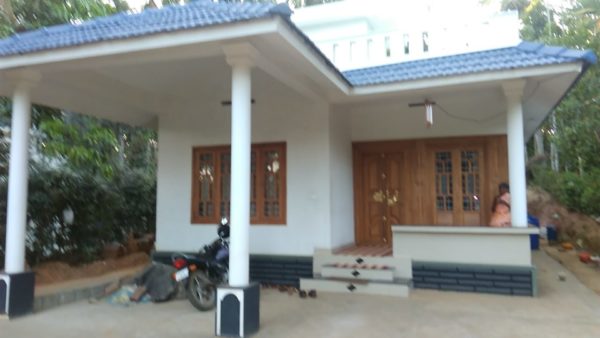
Shibu's new house
The WWS has around 97 human settlements nestled within, with an approximate 2612 households and a population of 12,000. These occupy around 34,000 acres of land, out of the total 85,000 acres of forest land. So far, around 305 families in the sanctuary have moved out under the first phase of voluntary relocation programme offered by the MoEFCC. All relocation schemes, initiated since the MoEF first proposed it in 1999, are voluntary by nature. In the case of Wayanad, it is funded by the MoEF & CC while the state government provides additional benefits.
Today, Shibu does remember the life in the forest as part of nostalgia, but has no regrets for having moved out. “In fact, we had been hoping for quite some time since the government first began talking of relocation in the 70s and 80s. But nothing was happening. Around this time, N Badusha and his organization offered some promise by way of informing them about the central government package. Prakriti Srivastava, an IFS officer on deputation to the central ministry, helped to push the package and make it a reality. If it was not for her, we are sure it would not have happened,” says Shibu. (Prakriti Srivastava, Country Director – WCS-India, who was APCCF under deputation from the central Ministry of Environment and Forests, enabled the first instalment for relocation from WWS in 2012.)
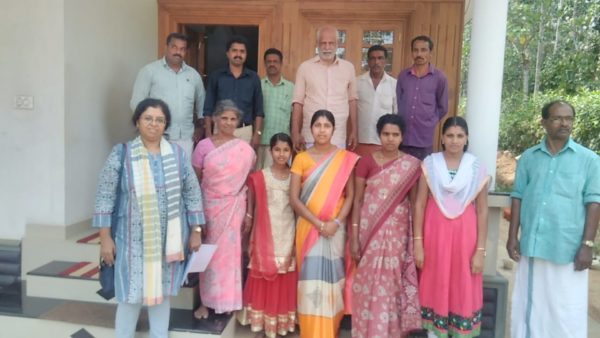
Ms. Prakriti Srivastava, IFS (left, bottom row) and Mr. N Badusha (top row, fourth from left) with Shibu and family.
After working a couple of years, Shibu plans to go back to Kerala and settle in some place nearby. For now, education for his daughters is his priority. Naturally so for the English teacher who struggled to reach his present position in life.
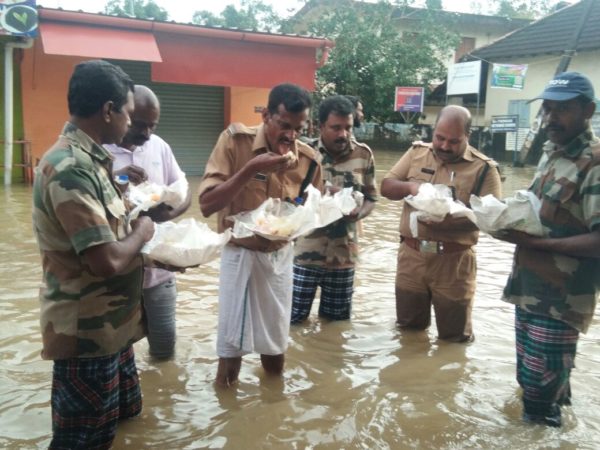
Shibu with his wife and two daughters
Team Outreach, WCS-I
Related Reading:
http://wcsindia.org/home/2018/08/08/wayanad-wildlife-sanctuary-man-and-animal-vying-for-space/
http://wcsindia.org/home/2018/06/05/whose-land-is-it-anyway/